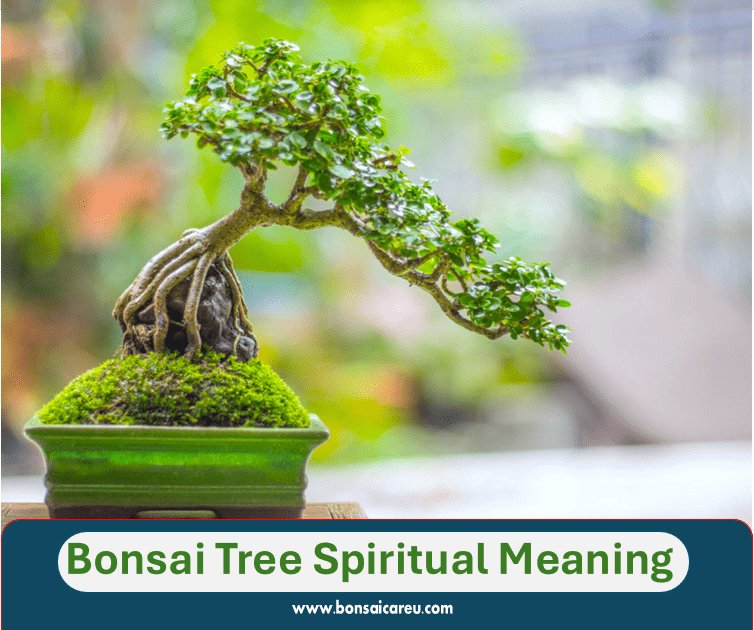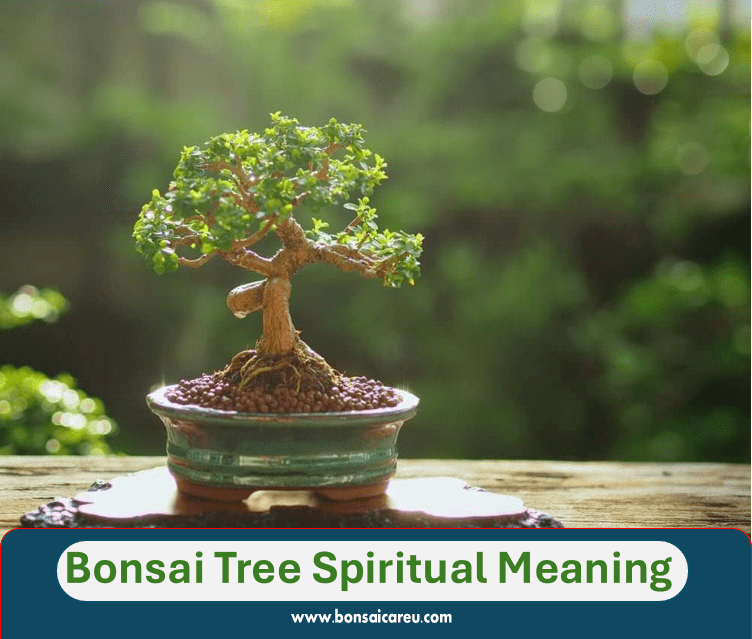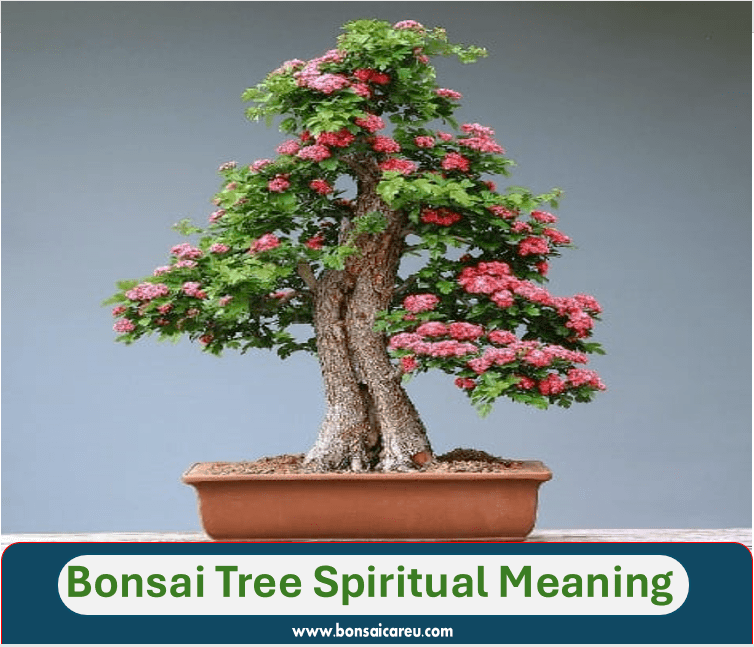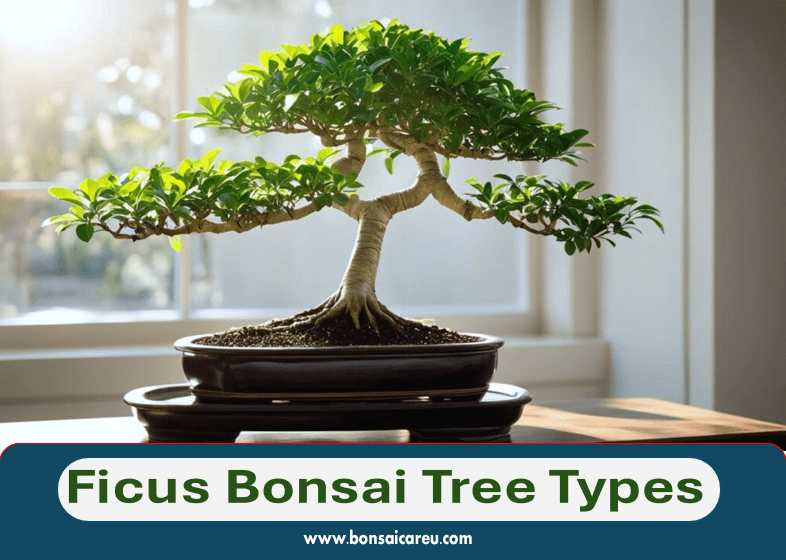Bonsai Tree Spiritual Meaning: The Bonsai tree symbolizes harmony, balance, and a deep connection to nature, reflecting spiritual growth and tranquility. Bonsai trees hold special significance in spiritual practices, embodying the essence of nature’s beauty and resilience.
Cultivating and caring for a bonsai tree requires patience, mindfulness, and a profound appreciation for the interconnectedness of all living things. Shaping and nurturing a bonsai tree is a meditative process that fosters inner peace and spiritual reflection.
As the tree grows and evolves, it reminds us of the cyclical nature of life and the importance of staying grounded amidst life’s challenges. Embracing the spiritual meaning of a bonsai tree can lead to a deeper sense of harmony and connection with the natural world.

The Art Of Bonsai
Bonsai, the Japanese art of cultivating miniature trees, has been practiced for centuries and holds profound spiritual significance. These tiny trees’ careful nurturing and pruning symbolize harmony, patience, and balance with nature. The art of bonsai is more than simply cultivating a plant; it is a way to connect with the spiritual world and find tranquility in nature’s beauty.
An Ancient Practice
Bonsai has an ancient and rich history, its roots tracing back to China over a thousand years ago. It was later adopted and refined by the Japanese, who developed their unique style of bonsai cultivation. This tradition has been passed down through generations, evolving into a revered art form that embodies the wisdom and spirituality of the East.
Bonsai Tree Symbolism
Bonsai trees are imbued with symbolic meaning, representing balance, harmony, and the eternal cycle of life. The miniature trees mirror a fully grown tree’s essence, capturing nature’s spirit in a small, contained form. Each carefully pruned branch and shaped trunk tells a story, reflecting the unity of man and nature and providing peace and mindfulness.
Spiritual Significance
The bonsai tree holds deep spiritual significance, symbolizing harmony, patience, and balance. It represents the connection between nature and the spiritual realm, providing a peaceful and grounding presence in various cultures and spiritual practices.
Connection To Nature
Bonsai trees hold deep spiritual significance due to their connection to nature.
Their small size symbolizes the vastness and importance of the natural world.
Meditative Practice
Caring for a bonsai tree is a meditative practice that fosters mindfulness.
It encourages us to slow down, focus on the present, and connect with the tree’s energy.
Bonsai Tree Types
Bonsai trees are not just beautiful and miniaturized versions of large trees. They also come in a variety of types and species. Understanding the different bonsai tree types can help you choose the one that resonates with your preferences and spiritual beliefs.
Deciduous Vs. Evergreen
Deciduous and evergreen are two main categories of trees, and bonsai trees are no exception. Deciduous trees shed their leaves during certain times of the year, while evergreen trees retain their foliage all year round. Each type of bonsai tree has its unique characteristics and symbolism.
| Deciduous Bonsai Trees | Evergreen Bonsai Trees |
|---|---|
|
|
Flowering Bonsai
Flowering bonsai trees hold a special allure with their delicate blossoms and captivating fragrances. These types of bonsai trees bring beauty to any space and provide a deeper spiritual meaning. Here are some popular flowering bonsai trees:
- Cherry Blossom Bonsai: Known as “Sakura” in Japan, the cherry blossom bonsai signifies renewal, the transience of life, and the appreciation of beauty. The ethereal pink blooms of this tree are a mesmerizing sight to behold.
- Wisteria Bonsai: The wisteria bonsai symbolizes grace, beauty, and love. Its cascading vines filled with fragrant lavender flowers evoke a sense of tranquility and joy.
- Azalea Bonsai: With its vibrant and abundant flowers, the azalea bonsai represents femininity, elegance, and harmony. Its colorful blossoms create a stunning display that captivates the eye.
Whether you choose a deciduous, evergreen, or flowering bonsai tree, each type carries its unique spiritual meaning. The bonsai tree you connect with can become a powerful reminder of the beauty and intricacy of nature, fostering a sense of peace, grounding, and reflection in your daily life.
Caring For Bonsai
Bonsai trees are not just beautiful indoor plants; they are also living symbols of patience, resilience, and spiritual harmony. Caring for a bonsai tree can be a deeply rewarding experience, allowing you to cultivate a serene atmosphere in your home while practicing mindfulness and artistic expression. To help you nurture your bonsai tree and maintain its spiritual meaning, we will explore two essential aspects of bonsai care: pruning and shaping and understanding soil and watering requirements.
Pruning And Shaping
Pruning and shaping are integral to the art of bonsai; they allow us to sculpt our trees into harmonious forms that reflect the beauty of nature. When it comes to pruning, it is essential to use sharp bonsai shears to make clean cuts and always prune during the appropriate season to promote healthy growth. Trim back any new shoots to maintain the desired shape, being mindful of the branch structure and maintaining the overall balance of the tree.
In terms of shaping, wire is commonly used to gently guide the branches into the desired position. Wrap the wire loosely to ensure it does not constrict the branch as it grows. Remember to remove the wire once the branch has set in its new shape to prevent damage.
Understanding Soil And Watering
Soil composition and watering routine are essential aspects of bonsai tree care. Proper soil composition ensures that your tree receives the necessary nutrients while allowing for proper drainage. Bonsai soil should be a well-draining mixture of organic materials such as peat or bark and inorganic materials like sand or gravel. Avoid regular potting soil, as it retains too much moisture and may suffocate the roots.
When it comes to watering, it is crucial to strike a delicate balance. Overwatering can lead to root rot and other diseases, while underwatering can cause the tree to wither and die. Before watering, gently insert your finger into the soil to determine its moisture level; if it feels dry up to your first knuckle, it’s time to water. Be sure to thoroughly water the tree until excess water drains out of the drainage holes, allowing the soil to moisten evenly.
In Conclusion
Caring for a bonsai tree is a deeply fulfilling endeavor that enhances the aesthetic appeal of your space and provides an opportunity for spiritual connection and personal growth. By mastering the art of pruning and shaping and understanding the importance of proper soil composition and watering, you can cultivate a bonsai tree that flourishes with vitality, beauty, and symbolism.
Bonsai In Different Cultures
Bonsai transcends beyond mere decoration, carrying profound spiritual significance in various cultures.
Japanese Influence
- Bonsai originated in Japan, deeply rooted in Japanese culture.
- Japanese aesthetics emphasize harmony, simplicity, and nature in bonsai art.
- Each bonsai tree represents Japanese values like patience, serenity, and respect.
Bonsai In Zen Buddhism
- Bonsai reflects Zen philosophies, promoting meditation and mindfulness.
- Zen practitioners find spiritual solace and harmony through nurturing bonsai trees.
- The intricate care of bonsai mirrors the path to enlightenment in Zen teachings.

Creating Harmony
The spiritual meaning of bonsai trees is deeply rooted in the concept of creating harmony. Bonsai trees are not just miniature versions of larger trees; they are representations of balance, tranquility, and the interconnectedness of all living things. In this blog post, we will explore the spiritual significance of bonsai trees and how they can bring a sense of harmony into our lives.
Balance And Tranquility
Bonsai trees are revered for their ability to evoke a sense of balance and tranquility. Through intricate pruning and careful cultivation, these trees exemplify nature’s delicate equilibrium. The art of bonsai teaches us the value of patience, as it takes years of dedication to shape a tree into a harmonious masterpiece. Each branch and leaf is intentionally placed to create a symphony of form and function, reminding us to find equilibrium in our lives.
Bonsai Feng Shui
In the practice of Feng Shui, the art of arranging objects to achieve harmony with the environment, bonsai trees hold special significance. Placing a bonsai tree in a specific home area is believed to invite positive energy and promote a sense of tranquility. The miniature size of bonsai trees also symbolizes humility and respect for nature, aligning with the principles of Feng Shui to create a harmonious living space.
Bonsai Tree In Modern Life
The Bonsai tree has a rich spiritual meaning that transcends time and culture. It symbolizes harmony, peace, and balance, making it a cherished element in modern life. The art of cultivating Bonsai trees aligns with the current societal emphasis on mindfulness, stress reduction, and overall well-being.
Stress Reduction
Bonsai trees have a calming effect on individuals, creating a serene environment that aids in reducing stress and anxiety. Tending to a Bonsai tree allows for a peaceful escape from the hustle and bustle of modern life.
Mindfulness And Well-being
The meticulous care and attention required for Bonsai trees promote mindfulness, encouraging individuals to live in the present moment. Engaging with Bonsai trees fosters a sense of well-being and tranquility, offering a break from the fast-paced nature of modern living.

Frequently Asked Questions For Bonsai Tree Spiritual Meaning
What Do Bonsai Trees Symbolize?
Bonsai trees symbolize harmony, balance, and patience in Japanese culture. They represent miniature versions of nature.
Is Bonsai A Spiritual Plant?
Yes, bonsai is considered a spiritual plant in many cultures due to its symbolism of harmony, balance, and patience. Cultivating and caring for bonsai trees is often associated with mindfulness and introspection, making it a spiritual practice for many enthusiasts.
What Is The Message Of The Bonsai?
The message of the bonsai is about patience, simplicity, and the appreciation of the beauty of small things. It represents harmony and balance in life. As a symbol of tranquility, it encourages us to be present and enjoy the journey.
What Is Symbolic About Bonsai?
Symbolically, bonsai represents patience, harmony, and the beauty of nature in a small and serene form. The careful cultivation and shaping of bonsai trees reflect the balance between human intervention and the natural world. It is a living art that embodies tranquility and connection to the natural world.
What Is The Spiritual Significance Of Owning A Bonsai Tree?
Owning a bonsai tree symbolizes harmony, balance, and a connection with nature. It is believed to promote patience and mindfulness.
How Does A Bonsai Tree Bring Peace And Tranquility?
A bonsai tree’s serene presence and the process of tending to it can help reduce stress and promote a sense of calmness and relaxation.
Conclusion
In exploring the spiritual meaning of bonsai trees, we uncover a deep connection to nature. Each tree symbolizes growth, resilience, and harmony, fostering a sense of peace and tranquility. Through caring for these miniature wonders, we nurture our spiritual journey and find solace in their beauty.


